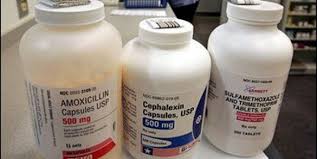Unlocking Access: Free Antibiotics Prescription Solutions for All

Free Antibiotics Prescription: A Guide to Accessing Antibiotics Without a Prescription
Antibiotics are essential medications that help treat bacterial infections and save lives. However, obtaining antibiotics typically requires a prescription from a healthcare provider. But what if you need antibiotics urgently and don’t have access to a doctor or cannot afford a visit?
Online Resources
There are online platforms and telemedicine services that offer free consultations with licensed healthcare professionals who can provide prescriptions for antibiotics if deemed necessary. These services often cater to individuals who may not have easy access to traditional healthcare settings.
Community Health Clinics
Community health clinics and free clinics may also provide access to antibiotics without requiring a prescription. These facilities aim to serve underserved populations and offer essential healthcare services at little to no cost.
Patient Assistance Programs
Some pharmaceutical companies offer patient assistance programs that provide free or low-cost antibiotics to individuals who meet specific eligibility criteria. These programs can be accessed through the pharmaceutical company’s website or by contacting their customer service.
Over-the-Counter Options
In some countries, certain antibiotics are available over the counter at pharmacies without a prescription. It is essential to consult with the pharmacist or healthcare professional before purchasing these medications to ensure they are appropriate for your condition.
Cautions and Considerations
While accessing antibiotics without a prescription may be possible through various channels, it is crucial to use these medications responsibly. Antibiotic misuse can lead to antibiotic resistance, making infections harder to treat in the future. Always follow the prescribed dosage and duration when taking antibiotics.
Essential Tips for Safely Obtaining and Using Free Antibiotic Prescriptions
- Consult with a healthcare professional to determine if antibiotics are necessary.
- Follow the prescribed dosage and duration of the antibiotic treatment.
- Never share antibiotics with others or use leftover antibiotics.
- Inform your healthcare provider about any allergies or adverse reactions to antibiotics.
- Be aware of potential side effects and seek medical help if they occur.
- Do not self-diagnose or self-prescribe antibiotics.
Consult with a healthcare professional to determine if antibiotics are necessary.
It is crucial to consult with a healthcare professional to determine if antibiotics are necessary before seeking access to free antibiotics prescriptions. Healthcare professionals can assess your symptoms, conduct necessary tests, and provide an accurate diagnosis to determine if antibiotics are the appropriate treatment for your condition. This guidance helps ensure that antibiotics are used effectively and responsibly, reducing the risk of antibiotic resistance and promoting better health outcomes.
Follow the prescribed dosage and duration of the antibiotic treatment.
It is crucial to adhere to the prescribed dosage and duration of antibiotic treatment when accessing free antibiotics without a prescription. Following the recommended guidelines ensures that the medication effectively targets and eliminates the bacterial infection. Deviating from the prescribed regimen can lead to incomplete treatment, potentially allowing the bacteria to develop resistance to the antibiotic. By following the correct dosage and duration, you not only increase the effectiveness of the treatment but also contribute to combating antibiotic resistance in the long run.
Never share antibiotics with others or use leftover antibiotics.
It is crucial to never share antibiotics with others or use leftover antibiotics. Each antibiotic prescription is specifically tailored to treat a particular infection in an individual. Sharing antibiotics can lead to inappropriate use, ineffective treatment, and the development of antibiotic resistance. Additionally, using leftover antibiotics without proper medical supervision can be harmful and may not effectively address a new infection. Always consult a healthcare professional for a new prescription if needed, and never self-medicate or share antibiotics with others.
Inform your healthcare provider about any allergies or adverse reactions to antibiotics.
It is crucial to inform your healthcare provider about any allergies or adverse reactions you have experienced in the past when it comes to antibiotics. This information is vital in ensuring that the prescribed antibiotics are safe and suitable for you. By communicating your medical history regarding antibiotic allergies or reactions, you help your healthcare provider make informed decisions that prioritize your health and well-being.
Be aware of potential side effects and seek medical help if they occur.
It is important to be vigilant about potential side effects when accessing antibiotics without a prescription. While these medications can effectively treat bacterial infections, they may also cause adverse reactions in some individuals. If you experience any unexpected symptoms or side effects while taking antibiotics obtained through alternative means, it is crucial to seek medical help promptly. Consulting a healthcare professional can help ensure proper management of any adverse reactions and prevent complications that may arise from untreated side effects. Your health and well-being should always be a top priority when using antibiotics, even when obtained without a traditional prescription.
Do not self-diagnose or self-prescribe antibiotics.
It is crucial to emphasize the importance of not self-diagnosing or self-prescribing antibiotics, even when seeking free antibiotics prescriptions. Antibiotics are powerful medications that should only be used under the guidance of a healthcare professional. Self-diagnosis can lead to incorrect treatment choices, potentially worsening the condition or contributing to antibiotic resistance. It is essential to consult with a qualified healthcare provider for an accurate diagnosis and appropriate antibiotic prescription tailored to your specific medical needs.
Tags: accessing, antibiotic resistance, antibiotics, community health clinics, eligibility criteria, free antibiotics prescription, free clinics, healthcare provider, licensed healthcare professionals, online resources, over-the-counter options, patient assistance programs, pharmaceutical companies, pharmacies, prescription, responsible use, telemedicine services, underserved populations